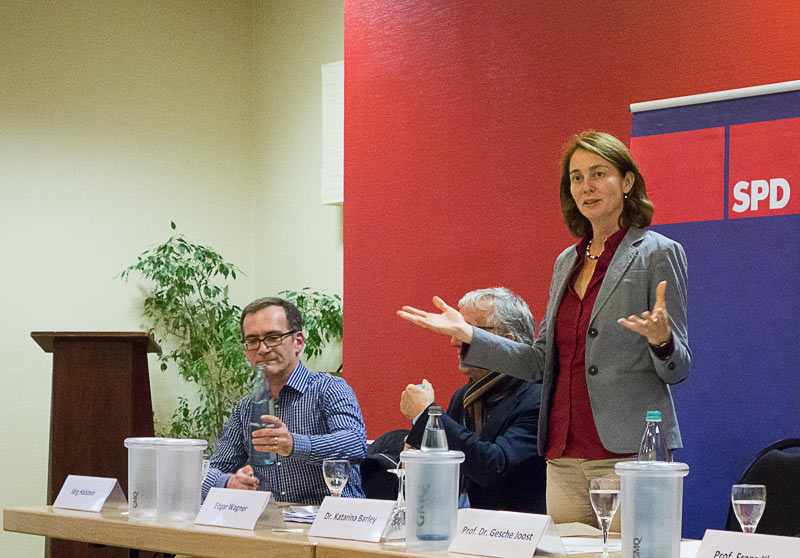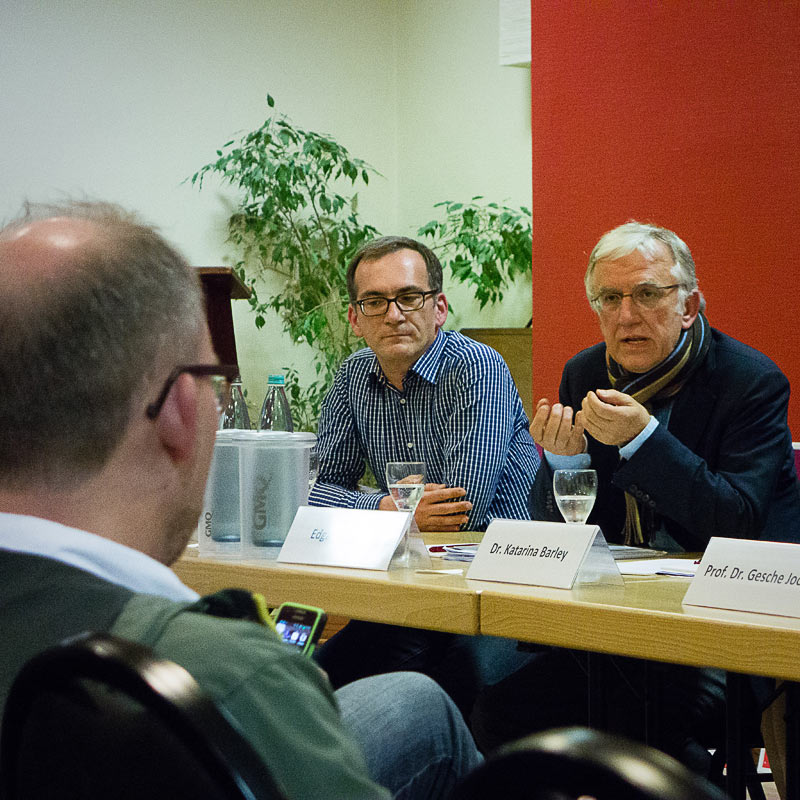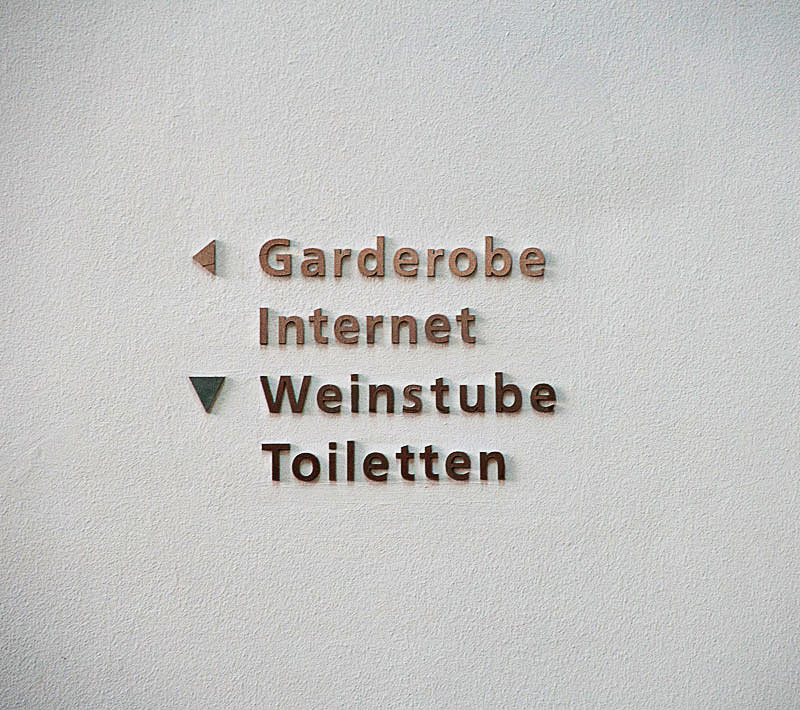Discussion with Gesche Joost Election campaign in uncharted territory
Last Monday, design researcher Gesche Joost from the SPD’s expert team was a guest in Trier and discussed her approaches to internet policy. The title was promising: “Brave New World Internet? Opportunity – Surveillance – Economic Factor” – that is three things at once, and expectations were correspondingly high. What can be put on the agenda in detail?
Media literacy, broadband expansion, and total surveillance
Gesche Joost kicked off with a keynote speech that spanned her political program. She began with a brief account of her personal internet biography: “I got to know the internet as a space of great new possibilities,” and the ideas of the internet as a citizens’ forum have come true in many ways. “But then, the NSA scandal hit us like a bolt of lightning,” Joost explained. This has unsettled people and destroyed a great deal of trust.

The most important points of her lecture from my point of view:
- She sees two central factors in the context of the networked society. The first is media literacy, which should be taught in primary school in order to “learn how to design the network”. This also includes teaching students a programming language.
- The second basis is broadband expansion as a technological prerequisite for networking. This is not regulated by the market – the SPD has therefore set up a broadband fund.
- The design researcher particularly emphasized the principles of “open everything” – public data and educational opportunities should be universally accessible, as this offers great opportunities.
- Despite the loss of trust in the wake of total surveillance, Gesche Joost does not see doing without the internet as an alternative. Rather, she believes that measures at three levels make sense.
- At the national level, the focus is on IT security. Security standards must be created so that German companies cannot be spied on. In addition, data protection can be considered a location factor – “privacy by design” could thus become a selling point.
- “However, the internet does not stop at national borders.” At the EU level, the issue is therefore a European data protection agreement, for example, based on the idea that German data protection law should also apply to German users of a service, regardless of the provider’s physical server location. There should also be a right to delete data.
- At the international level, Joost would like to advocate for a global Internet law. Civil rights must also apply on the internet – “this will certainly not be easy, but it must be addressed,” as Joost emphasized.

The last 45 minutes were reserved for a podium discussion, followed by a question and answer session, moderated by SPD candidate Katarina Barley. The first question was for Gesche Joost: “Is society dividing into onliners and offliners?” The researcher responded with a brief summary of her research work. In fact, the desire to be able to switch off from permanent accessibility was a central topic for the participants in a study, and she also observed self-imposed information diet of her doctoral students during important work phases. “Ultimately, we have to grow up in the way we deal with media” – this is an important part of media literacy.
A disaster for data protection
Edgar Wagner, the data protection commissioner for the state of Rhineland-Palatinate, was a professional admonisher on the podium. He emphasized that not everything can be open – despite all sympathy for transparency and accessibility, there must be limits. He explicitly welcomed the Transparency Act announced by Minister President Malu Dreyer. Wagner is also a member of the State Council for Digital Development and Culture, in which people with different perspectives are to develop recommendations for action for the state.
The NSA scandal is a betrayal of internet freedom and no longer has anything to do with the rule of law.
He did not have good words for the activities of the intelligence services. “The NSA scandal is a data protection disaster” because it is global, independent of any specific suspicion, and involves large internet companies and providers. “This is a betrayal of the freedom of the Internet and has nothing to do with the rule of law,” explained Wagner, adding that while the response to the terrorist attacks of September 11 is understandable, it does not change the fact that the intelligence services are crossing all boundaries.

What can be done about it? “Whistleblowers are the effective control of the intelligence services, not the data protection officers.” There are difficult national differences, so that you cannot simply regulate the standards. As a concrete idea, Edgar Wagner mentioned that the information transparency law must explicitly apply to intelligence services as well – currently, they are excluded from it.
The data protection officer is naturally critical towards the increasing blurring of the lines between private and public. Wagner clarifies: “We need privacy, and the boundaries are negotiated by society.” Ultimately, data protection is about self-determination – everyone should be able to decide for themselves what personal information can be revealed. “However, I often have no perspective on the internet,” Wagner regretted.
The internet as a business opportunity
Hunderttausend managing director Jörg Halstein represented the business side on the panel and shifted the focus of the discussion to the concerns of companies. “First of all, as a user, I need to know that I am being tracked as an advertising target group,” he said, explaining the business concept of the online advertising industry. At the same time, however, the internet enables new possibilities for interacting with users, only to qualify this immediately: “We use these possibilities very carefully, because there are often no clear rules and a great deal of legal uncertainty.” As an example, he cited the efforts of the data protection commissioner of Schleswig-Holstein to regulate Facebook fan pages – there is always the risk of a lawsuit.
The second scholar in the series, Franz Kluge (dean of the design faculty at Trier University of Applied Sciences), made it clear that “escaping the net is absurd.” He compared the development with that of Baron Haussmann, who, in reaction to changing production conditions, largely transformed the face of the city of Paris. The question is, therefore, how we deal with new developments, such as not being able to foresee the future. As a further aspect, he described the network as a cultural space that is shaped by designers – “our society is increasingly characterized by aestheticization, even if that sounds a bit academic now”.
Media literacy between school, training and society
One of the big buzzwords in our education debate was media literacy, which was the subject of the small discussion group. Jörg Halstein believes that political decision-makers in particular need to be trained in media literacy: “Developments such as the so called “Leistungsschutzrecht” or the planned but never implemented inclusion of websites in the German National Library do not present a good picture.” Gesche Joost agreed with him, not without making a few pointed comments about her political opponent. “Politicians often lag behind developments.” She said that students are often ahead of them in this regard, and feel that e-mails are already out of date.
There is a huge deficit in media literacy, especially in universities.
Professor Kluge took a broader, but also more abstract, approach: in schools, media literacy is often seen as a kind of “internet driving license” – but it is not only about the ability to use media, but also to create them. “It is precisely in this area that I see a huge deficit, especially in universities – our innovations are still shaped by engineers, not by users.”
Campaign between approval and criticism
“So how do we actually implement all this? After all, it is an election campaign!” said a man from the audience, giving Gesche Joost the opportunity to elaborate on a few ideas. Should there be an internet ministry with the SPD? Check. Should free Wi-Fi be promoted and liability regulations (so-called “Störerhaftung”) reformed? Check. And a cap on dissuasions? Check. At the same time, however, the phenomenon of illegal downloads must be combated – but it remains unclear how this can be achieved in practice.

In the last few minutes of the discussion, there were also small critical points on the podium. Jörg Halstein noted that the SPD approach of a broadband fund was not enough: “We are being left behind, there is diaspora in rural areas, on top of that there is throttling of LTE connections, and the throttling plans of Deutsche Telekom – this is a disaster!” Gesche Joost defended the SPD’s broadband program – the budget has been fully planned, and the program could ensure expansion without incurring debt. In addition, network neutrality must be secured by law, and a watchful eye must be kept on Deutsche Telekom’s plans.
Many starting points – and yet some questions
Personally, Gesche Joost convinced me completely – in what she said. But I also think of what was not said, and much remained unclear. Despite all the criticism of total surveillance, data preservation is still on the SPD's agenda. This leaves me with a unclear picture of what to think of the SPD’s digital policy – but their willingness to engage in dialogue and their commitment to bringing the issue to the region deserves recognition. As always, you should form your own opinion, for example with the election manifesto or one of the numerous online tools from my last reading tips. And please: go vote, especially because there is reason to worry about democracy.